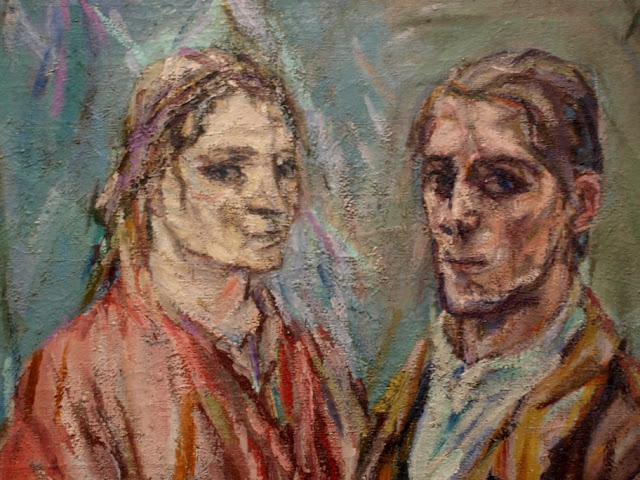The Kunsthaus Zürich presents Oskar Kokoschka – Expressionist, migrant and pacifist – in the first retrospective of his work in Switzerland for 30 years. The highlight among the more than 200 exhibits is the monumental ‘Prometheus Triptych’, which has never before been seen in Switzerland.
Oskar Kokoschka (1886–1980) is, along with Francis Picabia and Pablo Picasso, one of a generation of artists who retained their allegiance to figurative painting after the Second World War, even as abstract art was consolidating its predominance.
It is also thanks to them that non-representational painting and figurative art can now be practised side by side without partisan feuding. Artists of the present day value the gestural articulation of his brushwork, praise his open-minded, cosmopolitan attitudes or share the pacifism that, especially after the traumatic experiences of the First World War, runs like a thread through Kokoschka’s work, life and legacy.
Following his last major solo show in 1986, the Kunsthaus now sets out to acquaint a new generation of visitors with this artist, who died by Lake Geneva in 1980 and whose works are held in substantial numbers in both Vevey and Zurich.
Migrant and European
The retrospective traces the motifs and motivations of a painter who felt at home in no fewer than five countries. Curator Cathérine Hug has brought together 100 paintings and an equal number of works on paper, photographs and letters from all phases of his career. They reveal that while Kokoschka’s art was defamed as ‘degenerate’ by the Nazis, the artist himself came through the ordeal relatively unscathed, making a living executing commissions for celebrated figures in the worlds of literature, architecture and politics. In exile he becomes an indomitable champion of freedom, democracy and human rights; a humanist whose work is broad enough to encompass everything from landscapes and portraits to mythological figures and metaphors denouncing the horrors of war and defending the power of love and the beauty of nature. It is this independent-minded artistic language of political protest that makes Kokoschka unique.
Triptychs on show for the first time outside Britain
Two impressive triptychs, each around eight metres wide and two metres high –

Prometheus: 239 x 234 cm,
The Samuel Courtauld Trust, The Courtauld
Gallery, London, © Fondation Oskar Kokoschka /
2018 ProLitteris, Zurich



Foto: UHH/Karin Plessing & Reinhard Scheiblich
Inventarnummer: Inv.-Nr. 05-06
Künstler: Oskar Kokoschka
Titel: Thermopylae oder Der Kampf um die Errettung des Abendlandes
Technik / Material: Tempera auf Leinwand
Datierung: 1954
Maße: 225 x 800 cm
Standort: Philosophenturm, EG, Hörsaal D
Inventarnummer: Inv.-Nr. 05-06
Künstler: Oskar Kokoschka
Titel: Thermopylae oder Der Kampf um die Errettung des Abendlandes
Technik / Material: Tempera auf Leinwand
Datierung: 1954
Maße: 225 x 800 cm
Standort: Philosophenturm, EG, Hörsaal D

Foto: UHH/Karin Plessing & Reinhard Scheiblich
Inventarnummer: Inv.-Nr. 05-06
Künstler: Oskar Kokoschka
Titel: Thermopylae oder Der Kampf um die Errettung des Abendlandes
Technik / Material: Tempera auf Leinwand
Datierung: 1954
Maße: 225 x 800 cm
Standort: Philosophenturm, EG, Hörsaal D
The imposing ‘Prometheus’ triptych – originally a ceiling decoration for an aristocratic client in London – has not been shown outside the British Isles since 1953, when it travelled to the Venice Biennale. Like the ‘Thermopylae’ triptych the depiction of Prometheus, originator of human civilization, enjoins human beings to come together as brothers and sisters in peace and freedom. Aside from their content, these works also document the creative process that set Kokoschka apart from his contemporaries. The brushwork and colour progressions reveal the artist’s movements – a performative production process unusual in figurative painting. Kokoschka, the Expressionist who remained faithful to figurativism and founded a ‘School of Seeing’ that endures to this day in Salzburg, was regarded by many at the time as anti-modern; in fact he fought for democratic access to education and an open society.

- Oskar Kokoschka, Mother and Child
Embracing, 1921–1922,
oil on canvas, 121 x 81 cm,
Belvedere, Wien, © Fondation
Oskar Kokoschka / 2018 ProLitteris, Zurich

- Oskar Kokoschka, Double Portrait of Oskar
Kokoschka and Alma Mahler, 1912/1913,
oil on canvas, 100 x 90 cm,
Museum Folkwang, Essen,
photo: Museum Folkwang Essen/Artothek,
© Fondation Oskar Kokoschka /
2018 ProLitteris, Zurich
- Oskar Kokoschka, Time, Gentlemen Please,
1971/1972, oil on canvas, 130 x 100 cm,
Tate: Purchased 1986, photo: Tate, London 2018,
© Fondation Oskar Kokoschka / 2018 ProLitteris, Zurich

- Oskar Kokoschka, Paul Scheerbart, 1910,
huile sur toile, 70 × 47 cm, Neue Galerie New
York, don de la Serge and Vally Sabarsky
Foundation, Inc., © Fondation Oskar Kokoschka /
2018 ProLitteris, Zurich

A catalogue in English and German (320 pages, 300 colour illustrations) published by Kehrer Verlag, Heidelberg, is available from the Kunsthaus shop and bookstores: ‘Oskar Kokoschka. Expressionist, Migrant, European’ with new essays by Régine Bonnefoit, Iris Bruderer-Oswald, Martina Ciardelli, Birgit Dalbajewa, Heike Eipeldauer, Katharina Erling, Cathérine Hug, Aglaja Kempf, Alexandra Matzner, Raimund Meyer, Bernadette Reinhold, Heinz Spielmann and Patrick Werkner.
